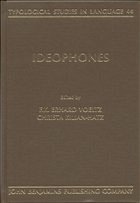Main description:
The present volume represents a selection of papers presented at the International Symposium on Ideophones held in January 1999 in St. Augustin, Germany. They center around the following hypotheses: Ideophones are universal; and constitute a grammatical category in all languages of the world; ideophones and similar words have a special dramaturgic function that differs from all other word classes: they simulate an event, an emotion, a perception through language. In addition to this unique function, a good number of formal parallels can be observed. The languages dealt with here display strikingly similar patterns of derivational processes involving ideophones. An equally widespread common feature is the introduction of ideophones via a verbum dicendi or complementizer. Another observation concerns the sound-symbolic behavior of ideophones. Thus the word formation of ideophones differs from other words in their tendency for iconicity and sound-symbolism. Finally it is made clear that ideophones are part of spoken language - the language register, where gestures are used - rather than written language.
Table of contents:
- Acknowledgements
- Introduction
- Ideophones in interaction with intonation and the expression of new information in some indigenous languages of Australia
- Ideophones and the nature of the adjective word class in Ewe
- Ideophones and compound verbs in Wolaitta
- Research on ideophones, whither hence?
- Setswana ideophones as uninflected predicative lexemes
- Phonosemantic correspondences in Emai attributive ideophones
- Defining ideophones in Mundang
- Some expressive and borrowed elements in the lexicon of Finnish dialects
- The ideophone in Didinga
- Ideophones in Ciluba
- Universality and diversity
- Expressives and iconicity in the lexicon
- Speaking the act
- Phonosemantic hierarchies
- Ideophones as the source of verbs in Northern Australian languages
- Ideophones in the Balto-Finnic languages
- The ideophone in Zulu
- Are ideophones really as weird and extra-systematic as linguists make them out to be?
- Ideas, phones and Gbaya verbal art
- Ideophones in Pastaza Quechua
- Le statut des idéophones en gbaya
- Iconic morphology and word formation in Ilocano
- Testing hypotheses about African ideophones
- Ideophonic adverbs and manner gaps in Emai
- Ideophone-like characteristics of uninflected predicates in Jaminjung (Australia)
- La formation des radicaux déidéophoniques et des idéophones déverbatifs en ttla (dialecte ewango)
- A comparison of some Southeast Asian ideophones with some African ideophones
- Bibliography of ideophone research
The present volume represents a selection of papers presented at the International Symposium on Ideophones held in January 1999 in St. Augustin, Germany. They center around the following hypotheses: Ideophones are universal; and constitute a grammatical category in all languages of the world; ideophones and similar words have a special dramaturgic function that differs from all other word classes: they simulate an event, an emotion, a perception through language. In addition to this unique function, a good number of formal parallels can be observed. The languages dealt with here display strikingly similar patterns of derivational processes involving ideophones. An equally widespread common feature is the introduction of ideophones via a verbum dicendi or complementizer. Another observation concerns the sound-symbolic behavior of ideophones. Thus the word formation of ideophones differs from other words in their tendency for iconicity and sound-symbolism. Finally it is made clear that ideophones are part of spoken language - the language register, where gestures are used - rather than written language.
Table of contents:
- Acknowledgements
- Introduction
- Ideophones in interaction with intonation and the expression of new information in some indigenous languages of Australia
- Ideophones and the nature of the adjective word class in Ewe
- Ideophones and compound verbs in Wolaitta
- Research on ideophones, whither hence?
- Setswana ideophones as uninflected predicative lexemes
- Phonosemantic correspondences in Emai attributive ideophones
- Defining ideophones in Mundang
- Some expressive and borrowed elements in the lexicon of Finnish dialects
- The ideophone in Didinga
- Ideophones in Ciluba
- Universality and diversity
- Expressives and iconicity in the lexicon
- Speaking the act
- Phonosemantic hierarchies
- Ideophones as the source of verbs in Northern Australian languages
- Ideophones in the Balto-Finnic languages
- The ideophone in Zulu
- Are ideophones really as weird and extra-systematic as linguists make them out to be?
- Ideas, phones and Gbaya verbal art
- Ideophones in Pastaza Quechua
- Le statut des idéophones en gbaya
- Iconic morphology and word formation in Ilocano
- Testing hypotheses about African ideophones
- Ideophonic adverbs and manner gaps in Emai
- Ideophone-like characteristics of uninflected predicates in Jaminjung (Australia)
- La formation des radicaux déidéophoniques et des idéophones déverbatifs en ttla (dialecte ewango)
- A comparison of some Southeast Asian ideophones with some African ideophones
- Bibliography of ideophone research

